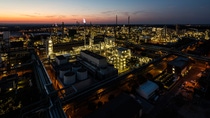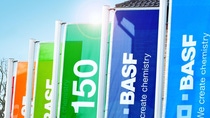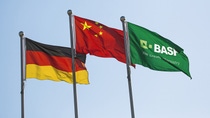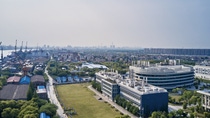BASF in Greater China 2021
BASF Group 2021 at a glance
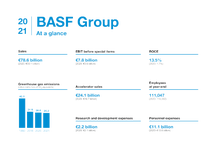.png)
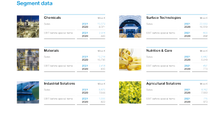
– Chemicals: The segment supplies BASF’s other segments and third-party customers with basic chemicals and intermediates.
– Materials: The segment offers advanced materials and their precursors for the plastics and plastics processing industries
– Industrial Solutions: The segment develops and markets ingredients and additives for industrial applications.
– Surface Technologies: The segment offers chemical solutions for surfaces such as battery materials and automotive coatings.
– Nutrition & Care: The segment produces ingredients and solutions for consumer applications, for example, nutrition and personal care.
– Agricultural Solutions: The segment is an integrated provider of seeds, crop protection and digital technologies and solutions.
At BASF, we create chemistry for a sustainable future.
We combine economic success with environmental protection and social responsibility. Over 111,000 employees contribute worldwide to the success of our around 90,000 customers in nearly all sectors.
Our customer portfolio ranges from major global customers and small and medium-sized enterprises to end consumers.
.png)
Sites and Verbund
As the world’s largest chemical company and industry leader, BASF has companies in 90 countries. We operate around 240 production sites worldwide – including Ludwigshafen, the world’s largest integrated chemical complex owned by a single company. It was there, in 1865, that the foundation stone was laid for the Verbund concept, which remains a key strength of BASF today: Intelligently linking and steering our plants in a Verbund structure creates efficient value chains – from basic chemicals to highly refined products such as coatings or crop protection. In the Verbund, we can manage our production in a resource-efficient, CO2-optimized and reliable way. For example, by using by-products from one factory as feedstocks elsewhere. This enables us to save raw materials and energy, avoid emissions, reduce logistics costs and exploit synergies.
In addition to Ludwigshafen, Germany, BASF operates Verbund sites in Antwerp, Belgium; Freeport, Texas and Geismar, Louisiana; Kuantan, Malaysia; and Nanjing, China. Another is currently being built in Zhanjiang in the southern Chinese province of Guangdong.
Ogranization of the BASF Group
We steer our six segments along our value chains to address the needs of our customers with differentiated solutions and business strategies.
We take a differentiated approach to steer our businesses according to market-specific requirements and the competitive environment. We provide a high level of transparency around the results of our segments and show the importance of the Verbund and value chains to our business success. BASF aims to differentiate its businesses from their competitors and establish a high-performance organization to enable BASF to be successful in an increasingly competitive market environment.
The operating divisions, the service units, the regions and the corporate center form the cornerstones of the BASF organization, in line with the corporate strategy. As part of the implementation of our strategy, we streamlined our administration, sharpened the roles of services and regions, and simplified procedures and processes. The organizational realignment created the conditions for greater customer proximity, increased competitiveness and profitable growth.
Our eleven operating divisions bear strategic and operational responsibility and manage the 50 global and regional business units and develop strategies for 75 strategic business units.
The regional and country units represent BASF locally and support the growth of business units with local proximity to customers. For financial reporting purposes, we organize the regional divisions into four regions: Europe, North America, Asia Pacific, and South America, Africa and Middle East.
Our research is currently divided into three global divisions: Process Research & Chemical Engineering, Advanced Materials & Systems Research and Bioscience Research. To strengthen our innovation capabilities, we will reorganize our global research activities in 2022 and align them even more closely with the needs of our customers. To this end, we will integrate downstream research into the divisions and bundle activities with broad relevance in a research unit. This unit will continue to be globally positioned with research centers in Europe, North America and Asia Pacific.
Five service units provide competitive services for the operating divisions and sites: Global Engineering Services, Global Digital Services, Global Procurement, European Site & Verbund Management, Global Business Services (finance, human resources, environmental protection, health and safety, intellectual property, communications, procurement, supply chain and inhouse consulting services).
Following the bundling of services and resources and the implementation of a wide-ranging digitalization strategy, the number of employees in the Global Business Services unit worldwide will decline by up to 2,000 by the end of 2022 compared with baseline 2019. From 2023 onward, the division expects to achieve annual cost savings of over €200 million.
The Corporate Center supports the Board of Executive Directors in steering the company as a whole. These include central tasks from the following areas: strategy, finance and controlling, compliance and law, tax, environmental protection, health and safety, human resources, communications, investor relations and internal audit.
Our Excellence Program aimed to contribute €2 billion to EBITDA annually until the end of 2021 onward compared with baseline 2018. We met this target in 2021. As planned, this was partly due to the reduction of more than 6,000 positions worldwide until the end of 2021. This decrease resulted from the organizational simplification and from efficiency gains in administration, the service units and the operating divisions.
Procurement and Sales Markets
BASF supplies products and services to around 90,000 customers1 from various sectors in almost every country in the world. Our customer portfolio ranges from major global customers and small and medium-sized enterprises to end consumers.
We work with over 70,000 Tier 1 suppliers2 worldwide. They supply us with important raw materials, chemicals, investment goods and consumables, and perform a range of services. Important raw materials (based on volume) include naphtha, liquid gas, natural gas, benzene and caustic soda.
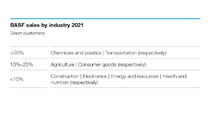
1 The number of customers refers to all external companies (sold-to parties) that had contracts with the BASF Group in the business year concerned under which sales were generated.
2 BASF considers all direct suppliers of the BASF Group in the business year concerned as Tier 1 suppliers. These are suppliers that provide us with raw materials, investment goods, consumables and services. Suppliers can be natural persons, companies or legal persons under public law.
Business and Competitive Environment
BASF’s global presence means that it operates in the context of local, regional and global developments and a wide range of conditions.
These include:
- Global economic environment
- Legal and political requirements (e.g. E.U. regulations)
- International trade agreements
- Industry standards
- Environmental agreements (e.g. E.U. Emissions Trading System)
- Social aspects (e.g. U.N. Universal Declaration of Human Rights)
BASF holds one of the top three market positions in around 80% of the business areas in which it is active. Our most important global competitors include Arkema, Bayer, Clariant, Corteva, Covestro, Dow, Dupont, DSM, Evonik, Huntsman, Lanxess, SABIC, Sinopec, Solvay, Sumitomo Chemical, Syngenta, Wanhua and many hundreds of local and regional competitors. We expect competitors from Asia and the Middle East in particular to continue to grow in significance in the years ahead.
Corporate Legal Structure
As the publicly listed parent company of the BASF Group, BASF SE takes a central position: Directly or indirectly, it holds the shares in the companies belonging to the BASF Group, and is also one of the largest operating companies. The majority of Group companies cover a broad spectrum of our business. In the BASF Group Consolidated Financial Statements, 258 companies including BASF SE are fully consolidated. We consolidate nine joint operations on a proportional basis and account for 27 companies using the equity method.
For more information on the companies belonging to the BASF Group, see: basf.com/en/corporategovernance

